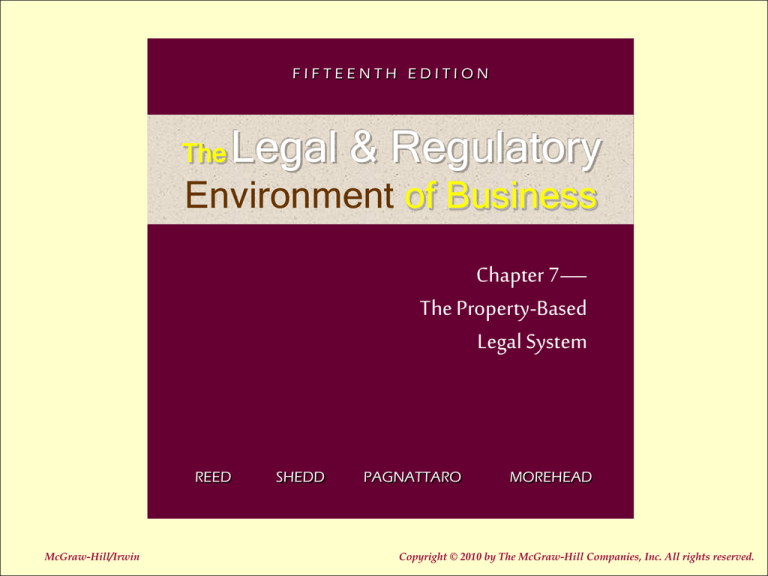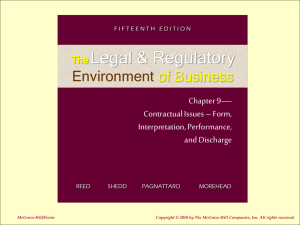
FIFTEENTH EDITION
The
Legal & Regulatory
Environment of Business
Chapter 7—
The Property-Based
Legal System
REED
McGraw-Hill/Irwin
SHEDD
PAGNATTARO
MOREHEAD
7-1
Copyright © 2010 by The McGraw-Hill Companies, Inc. All rights reserved.
Introduction
“The legal concept of
property
is vital to understanding
how law provides a
foundation for the
private market.”
7-2
Learning Objectives
To analyze the connection between a property-based
legal system and prosperity.
To understand property as an exclusive legal fence
and to identify narrow applications of property even
when they are not traditionally called “property”.
To grasp and apply the rules of security interests.
To evaluate the statement that private property
promotes the common good and be able to furnish
examples.
7-3
think think think
TANK TANK TANK
Is it likely for a nation to be prosperous
and maintain a vibrant market without
having a strong concept of private
property?
a. Yes
b. No
7-4
Property
Property
Means
The legal right to
exclude or keep
others from
interfering.
Ownership
Private,
exclusive
rights in
resources.
7-5
Property System
Arguably the most significant
issue for any society is how it
orders the relationships among
people concerning limited and
valued resources.
7-6
Property System
State comes into being
to address problem of
Limited
resources
State vs. private
property
Legal
frameworks
to address
problem
7-7
Property System
Property is central to
societal prosperity
Promotes
Incentives
Makes resources
easily divisible
Establishes
conditions for
capital formation
7-8
Basic Divisions of Property
Real Property
Personal
Property
Land and interests
in land
All other resources –
that are movable
7-9
pop pop pop
QUIZQUIZQUIZ
Private property premises the marketplace in
what ways?
a. promoting incentives for risk and
development.
b. recognizing divisibility of resources.
c. creating conditions for capital
formation.
d. all of the above.
7-10
Acquisition of Resources
Gift
Exchange
Accession
Methods by which
resources can be acquired
Confusion
1st Possession
Adverse
Possession
Original Possession
7-11
Types of Ownership
Fee simple – maximum
Life estate – for lifetime
Leasehold – rights of tenant
Concurrent – multiple owners
• Joint – different shares
• In common – all together
7-12
Ownership Title
Title and
Registration
Deed
Registration
(transfer of
title)
(notice)
7-13
Specialty Property Applications
Easements
Legal right of
passage across
land
Bailments
Goods placed into
another’s possession
to be returned
in future
7-14
Security Interests
In land
•Mortgages
•Deeds of trust
•Land sales contracts
Recording statutes – notice
Exercising property Interests
Foreclosure
Deficiency
Right of Redemption
7-15
Secured Transactions
Applies to personal property
Security interest in personal property given as
collateral
Attachment
Perfection
Financing statement
PMSI
Priority problems
7-16
Limitations on Property and the
Common Good
Private property has limits
Private property right is always subject to the
right of others
Private property gives way to the common
good of society
• Eminent domain
• Taxation
7-17
pop pop pop
QUIZQUIZQUIZ
Do secured interests that are recorded
“first in time” always take priority over
competing interests recorded later?
a. Yes
b. No
7-18
Nuisance
Public
Private
Use of land that
causes
inconvenience or
damage to the
public
Unreasonable use
of one’s property
so as to cause
interference with
enjoyment or use
of another’s land
7-19
Zoning
Exercise of police powers
Regulation of land use through
zoning ordinance
Limits to:
Use
Aesthetics
Variances
7-20
Duration Limitations
on Property
Patents
And
Copyrights
Rule against
perpetuities
• Lives in being plus
21 years
• Prevents multigeneration control of
one’s property interests
7-21
Eminent Domain
5th Amendment
Government taking private property for
public use
Just compensation
• market value
• may have jury determine
7-22
Taxation
To fund public services
• roads
• education
• law enforcement
• courts
• National defense
Article I, Section 8 of U.S. Constitution – federal
taxation
Income tax – 16th Amendment
7-23






